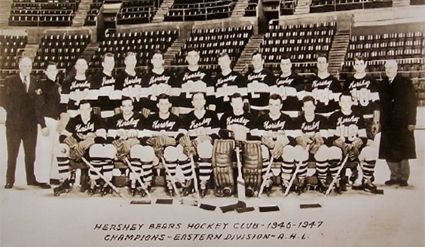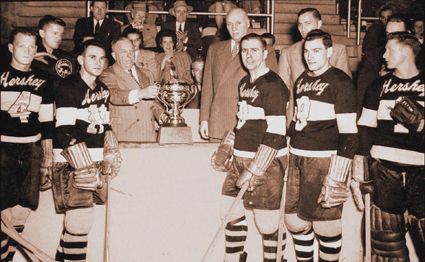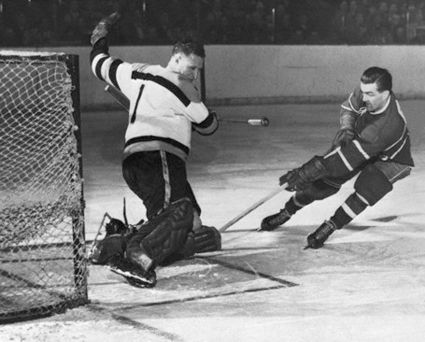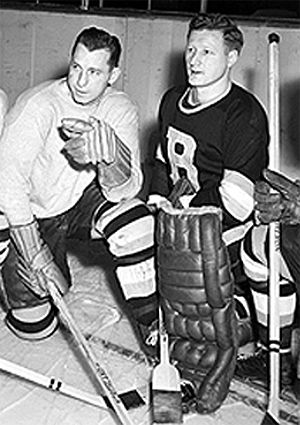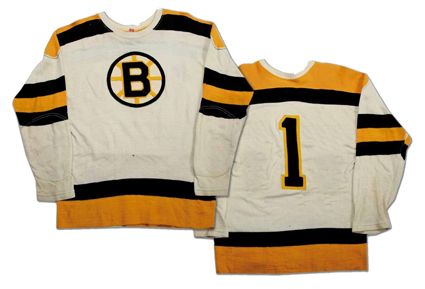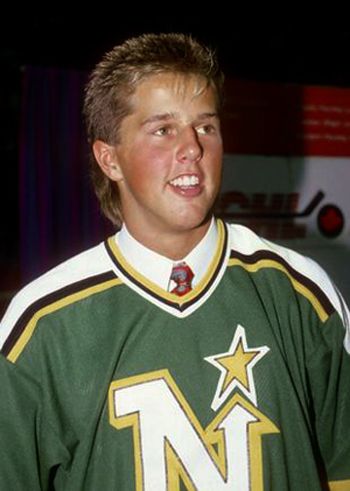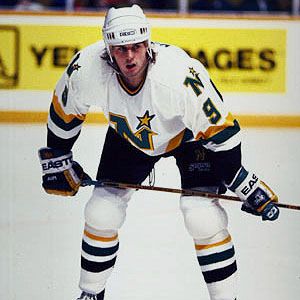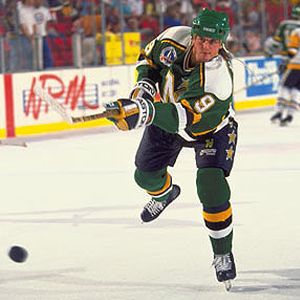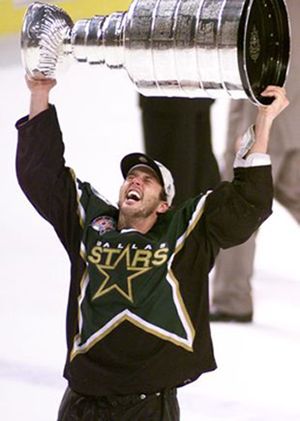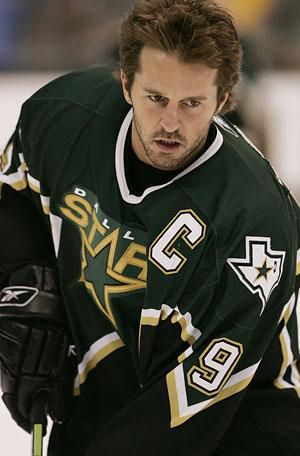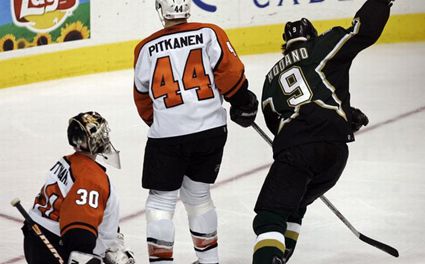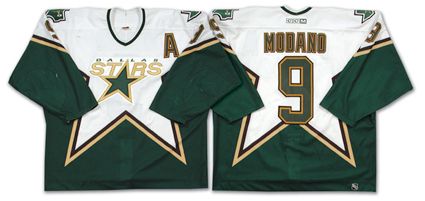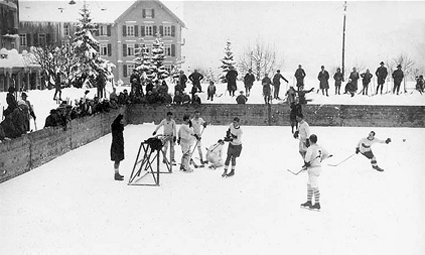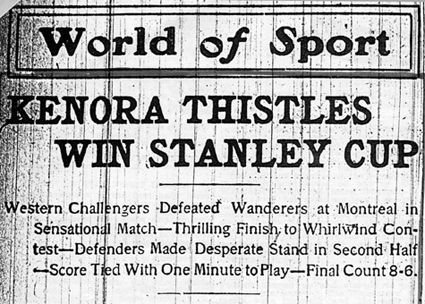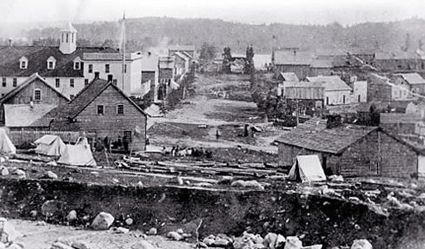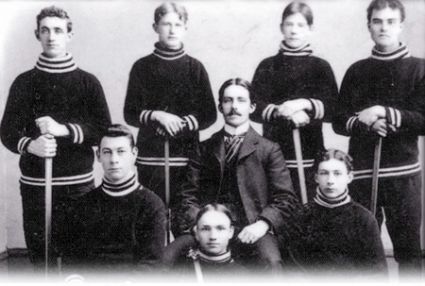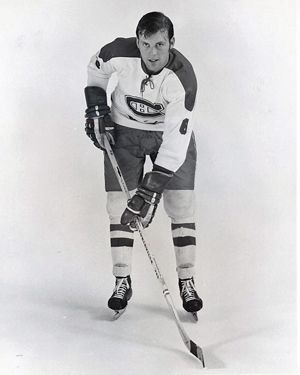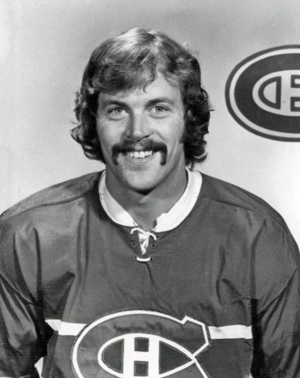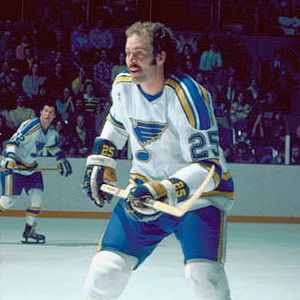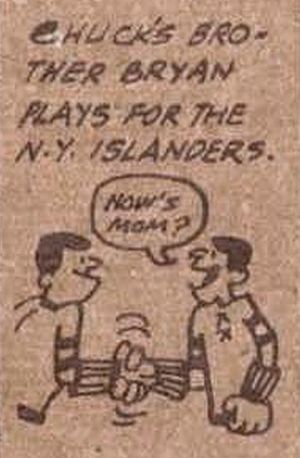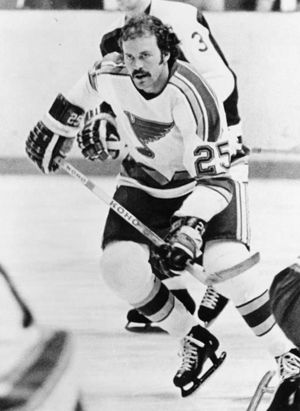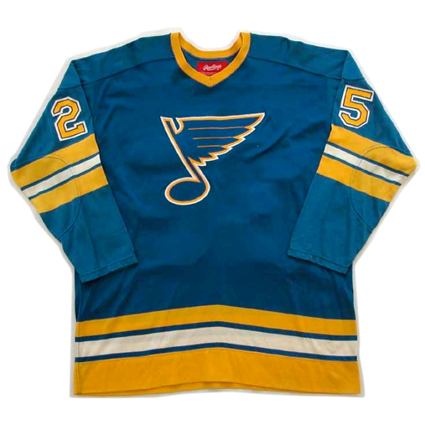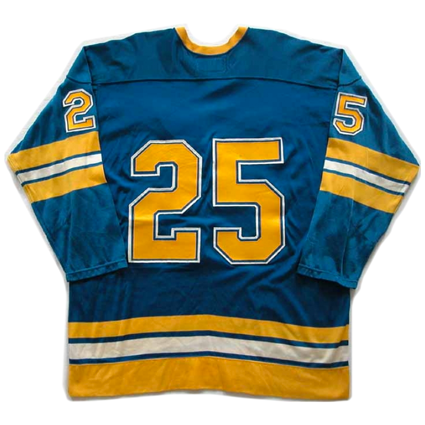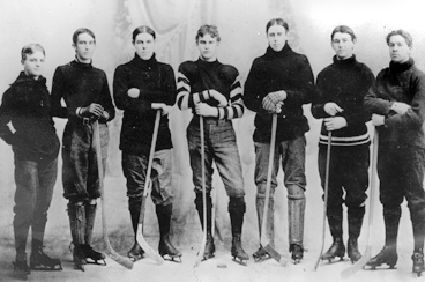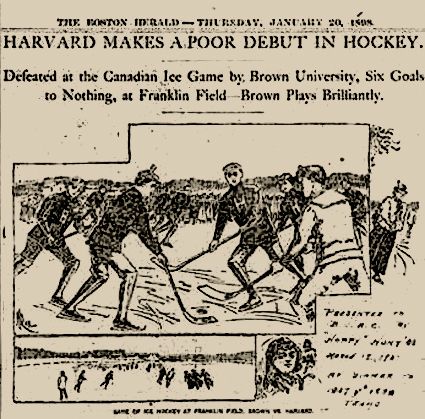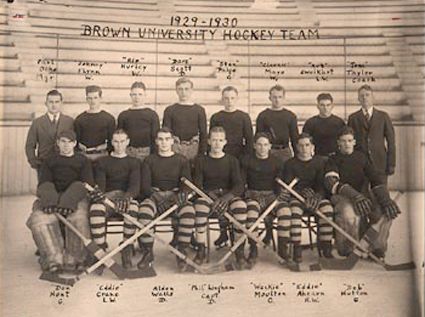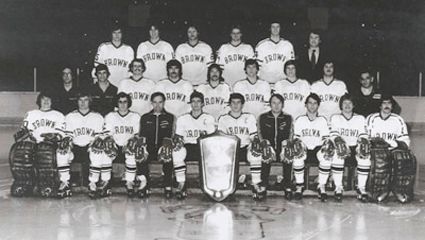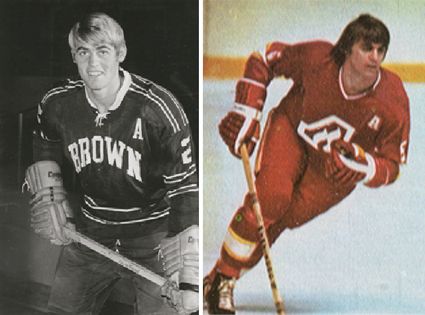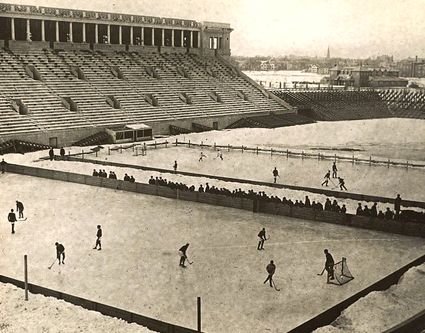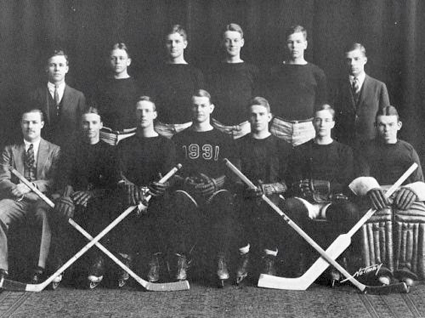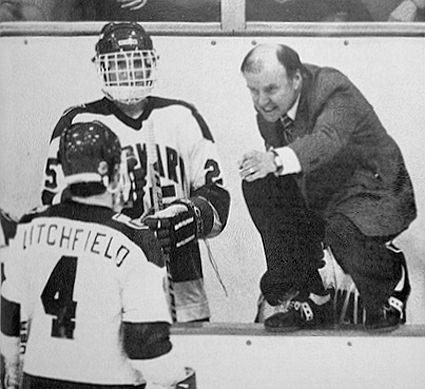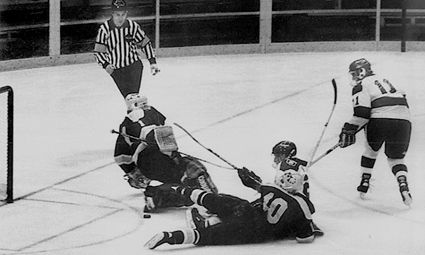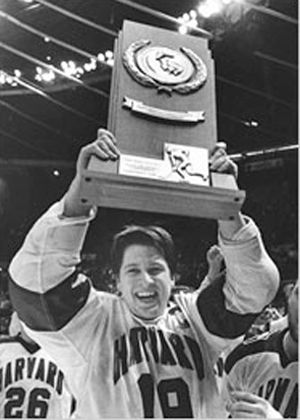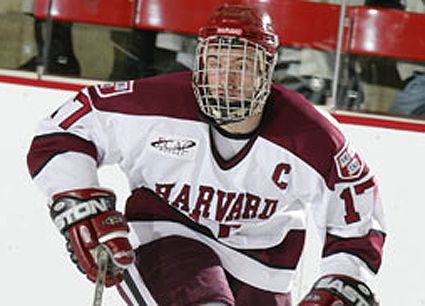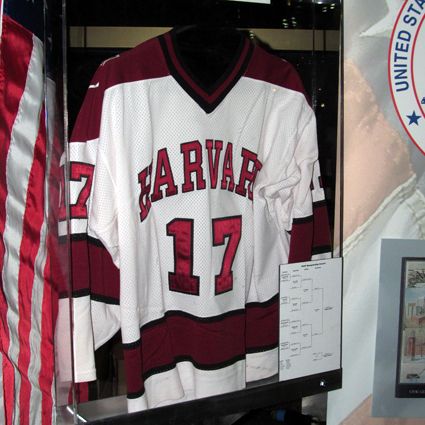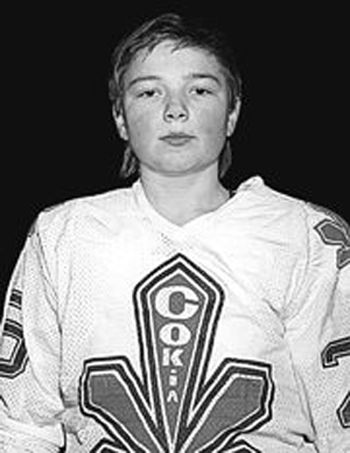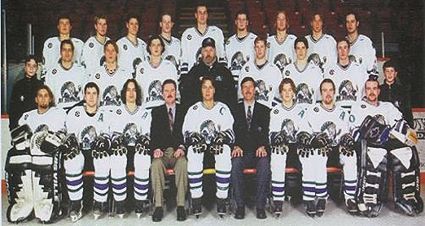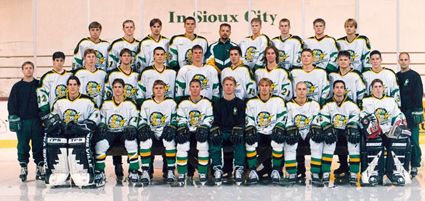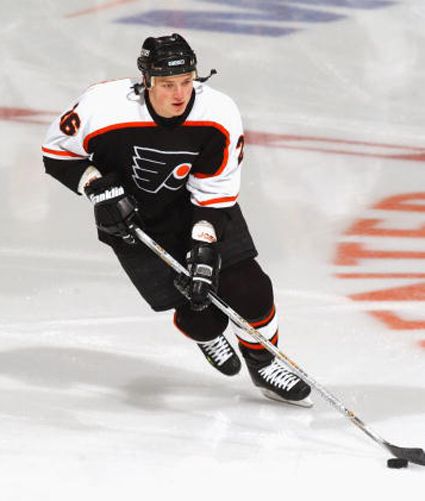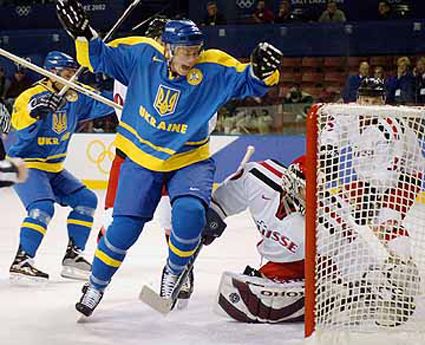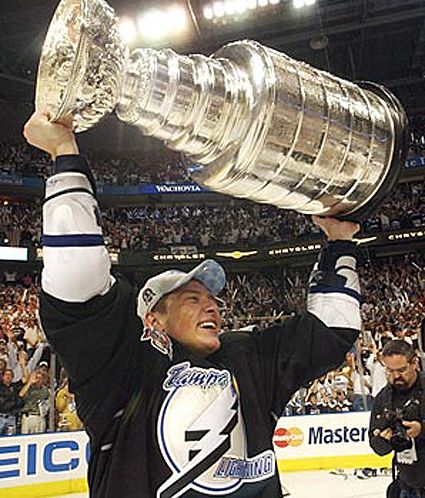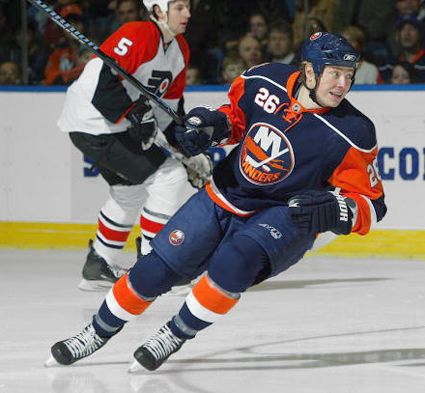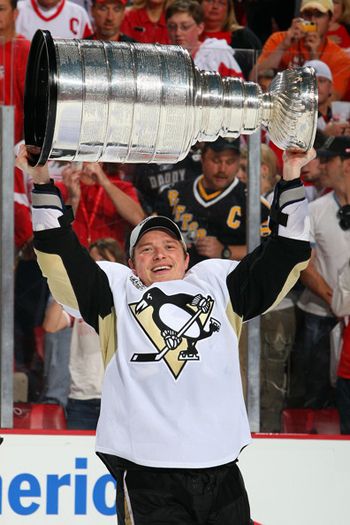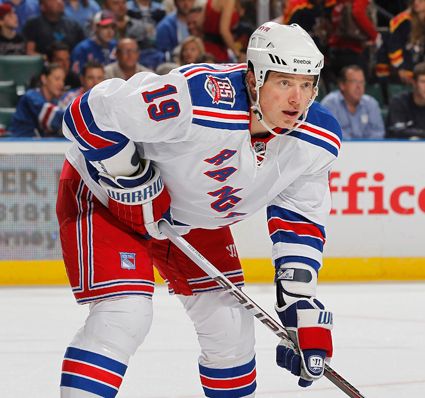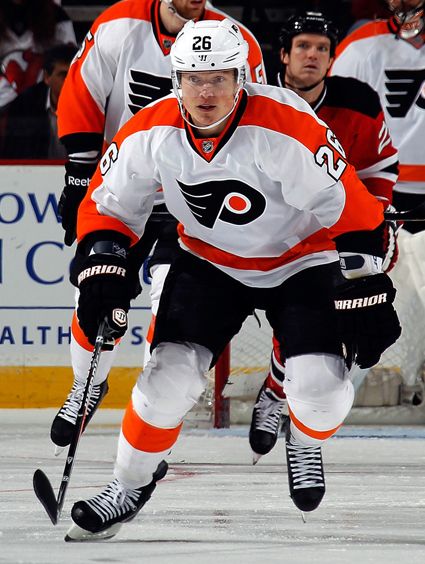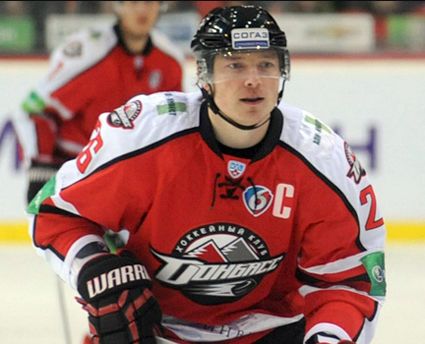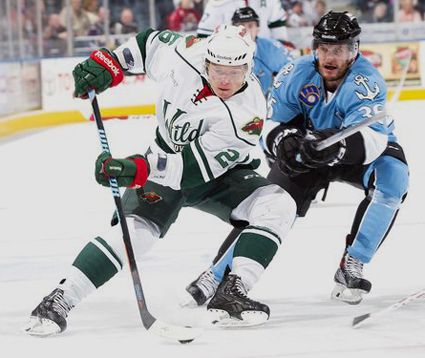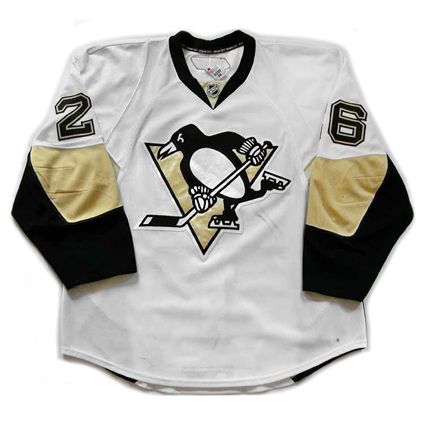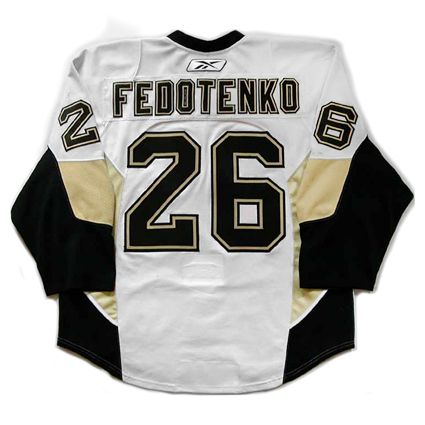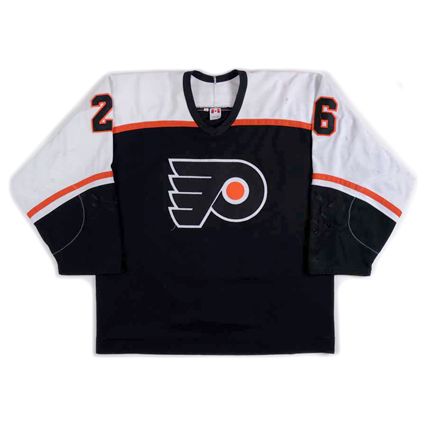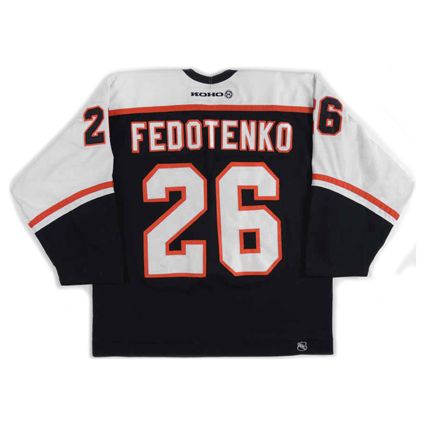Saturday, January 23, 2016
1949-50 Boston Bruins Gord Henry Jersey
Starting his career with his hometown Owen Sound Orphans in 1940, Gord Henry signed to play goal for the Philadelphia Falcons of the Eastern Amateur Hockey League for two seasons, beginning in 1943-44. He also appeared in three games for the Hershey Bears of the American Hockey League during the 1944-45 season.
The following season you never knew where Henry would surface next, as he played 16 games for Hershey in the AHL and 4 for the Baltimore Clippers and one each for the Falcons as well as the New York Rovers, all in the EAHL and four different clubs in all before ending his season with 3 playoff games for the Bears.
He spent the majority of his 1946-47 season with the Boston Olympics of the EAHL, seeing action in 43 games, winning 21. He again returned to Hershey at the end of the season, playing in 5 games before going 8-3 in the postseason with 5 shutouts and a 1.45 goals against average as the Bears won the Calder Cup as AHL champions for the first of eight times in team history.
The 1946-47 Hershey Bears
The Hershey Bears receiving the 1947 Calder Cup with Henry on the far right
With the championship on his resume, he became the dominant goaltender for Hershey for the next eight seasons, beginning with 68 appearances in 1947-48, winning 25. The following season he would again appear in 66 games for the Bears, winning 28 times. The Bears would return to the Calder Cup Finals that season after sweeping Indianapolis and Cleveland before taking the Providence Reds to a seventh game. Henry finished the postseason with a 7-4 record.
He would also make his NHL debut with with the Boston Bruins for a single, memorable game on this date in 1949 as he became only the 6th goaltender in league history to record a shutout in his first ever game, blanking the Montreal Canadiens 3-0.
Henry under attack by Maurice Richard of Montreal
He continued to be the mainstay in goal for Hershey in 1949-50 as well as making two more starts for the Bruins, dropping both contests despite a 2.50 goals against average.
Henry would set a career highs in 1950-51 as he appeared in 70 games, winning 38. Despite not playing any regular season games for Boston that season, he was called upon to make two starts in the playoffs for the Bruins.
Nearly equaling his stats from the previous season, he won 35 games from 68 starts in 1951-52. In 1952-53, the reliable Henry was again in goal for 64 games, winning 31 while leading the AHL in appearances for the third straight season and fourth time in his career, with the first being in 1949. Once again, the Bruins came calling during the postseason, as Henry saw action in 3 playoff games for Boston.
Milt Schmidt and Henry while with the Bruins
For the seventh consecutive season, Henry appeared in over 60 games with 63 and won 30 or more for the fourth consecutive season, totaling 33.
In 1954-55, he once more led the Bears in games played, but was limited to just 23 after being forced to miss the remainder of the season following a car accident in mid January, which ended his career with Hershey.
For the 1955-56 season he returned home to Owen Sound, playing 20 games with the Mercurys in senior hockey. His final game would come in 1956-57 with the Philadelphia Ramblers of the Eastern Hockey League before he retired from play.
Unusually, Henry would play in more NHL playoff games, five, than he would NHL regular season games, having appeared in just three, but memorably winning the first by shutout, only the 6th goaltender to do so.
Today's featured jersey is a 1949-50 Boston Bruins Gord Henry Jersey. In honor of the Bruins 25th anniversary in 1948-49, they would adopt a new logo, the spoked "B". The "B" was flanked by the numbers 24 and 49. For 1949-50, the "B" would change from a yellow curved font to a black block font, creating a new version of the logo which would remain unchanged for 45 years until a the logo would be updated with black outlines around the yellow spokes as part of a new set of jerseys adopted for their move from their long time home Boston Garden to the new Fleet Center.
Today's featured jersey would remain in use for just two seasons until the sleeves gained an extra yellow stripe and black sleeve ends.
photo courtesy of Classic Auctions
Today's video segment in on the Hershey Bears and their long time home, Hershey Park Arena.
Labels:
Boston Bruins,
Henry Gord,
Hershey Bears
Friday, January 22, 2016
2002-03 Dallas Stars Mike Modano Jersey
Opting to forego the American college hockey option, Michigan native Mike Modano chose to play Canadian junior hockey with the Prince Albert Raiders of the Western Hockey League beginning in the 1986-87 season. His impact was immediate, as he scored 32 goals and 62 points in 70 games. After following that up with a 47 goal, 127 point season in 1987-88, Modano became only the second American to be selected first overall in the NHL Entry Draft by the Minnesota North Stars, who were the club who made Brian Lawton the first American to be chosen #1 in 1983.
Modano played one more season with Prince Albert, scoring 105 points, before joining the North Stars for the 1989-90 season during which he made a virtually seamless transition to the NHL with 75 points in 80 games, instantly becoming a fan favorite in Minnesota.
During his second season in Minnesota, the team went on a miraculous run through the playoffs, reaching the Stanley Cup Finals despite a 27-39-14 regular season record. Modano contributed 20 points in 23 playoff games for fifth on the team in playoff scoring.
After two seasons of knocking on the door, Modano had his first 30 goal season in 1991-92 with 33. He repeated his 33 goal total in 1992-93, while his 60 assists propelled him to a career high 93 points.
The North Stars franchise was moved to Dallas for the following season where Modano repeated his 93 points, only this time thanks to a career high 50 goals which no doubt helped sell the game of hockey to the fans in Texas thanks to his speed and flair.
Starting in 1995-96, Modano began a period of being a regular 30 goal scorer, hitting that mark in six of the next seven seasons and scoring in the 80's six of the next eight, a streak that coincided with him becoming an alternate team captain.
The Stars went a long playoff run in 1998 which served as a precursor for the 1998-99 season when the franchise won it's first Stanley Cup in over 30 years of trying. Modano contributed 23 points in 23 games to lead the team in playoff scoring.
The Stars again returned to the finals the following season as Modano again tallied 23 points in 23 playoff games, one behind the team lead.
The 2000-01 season saw him score his 1,000th NHL point and he surpassed the 1,000 game mark in 2002-03, the same season he tied Neal Broten's franchise record for most games played with 992 on this date in 2003. Later in the same game he broke Broten's record for most assists in franchise history with the 594th of his career in a 4-2 Dallas win over the Columbus Blue Jackets.
Modano was named team captain for the 2003-04 and 2005-06 seasons, with the 2004-05 season being lost to the NHL lockout.
Modano was named team captain for the 2003-04 and 2005-06 seasons, with the 2004-05 season being lost to the NHL lockout.
He would play four more seasons in Dallas which included scoring his 500th NHL goal on March 13, 2007 and his 503rd goal to pass Joe Mullen for the record for most goals by an American-born player just four days later.
Modano celebrates his 500th NHL goal
Early in the following season Modano broke the record for most points by an American-born player when he passed Phil Housley with a shorthanded goal on November 7, 2007 for his 1,233rd point, a feat which was recognized by a phone call from the president!
At the conclusion of the 2009-10 season his 20 seasons with the Stars organization came to an end when it was announced he would not be re-signed. After much speculation concerning his possible retirement, Modano opted to sign with the Detroit Red Wings for the 2010-11 season but a deep cut from a skate severed a tendon in his hand, limiting him to just 40 games although he did return in time to participate in the playoffs to bring an end to his stellar career.
Modano holds records for the Most Goals by an American-born player (561), Most Points by an American-born player (1,374), Most Playoff Points by an American-born player (145) and Most Games Played by an American-born player (1,499) as well as Dallas franchise regular season and playoff records for games, goals, assists and points.
Today's featured jersey is a 2002-03 Dallas Stars Mike Modano jersey as worn during the season Modano reached 1,000 career games and set Stars franchise records for games played and assists.
This Dallas Stars first wore the green version of this jersey as an alternate during the 1997-98 season, mimicking the style worn in the 1994-1997 NHL All-Star Games. Even though it was an alternate jersey, Dallas opted to wear it during the playoffs and won the Stanley Cup while wearing it.
Following their Stanley Cup championship, the Stars promoted the striking jersey to their primary road jersey and created this white version to be worn at home. This style remained in use through the 2005-06 season until being replaced by the new Reebok Edge jerseys. As great as this jersey was, the ones that replaced it were among some of the worst of the new styles by far.
Our video section begins with a look at the career of Modano with plenty of goals and commentary on his impact on hockey in the south and comments from Modano himself.
Here, Modano becomes the leading American scorer in the history of the NHL.
Labels:
Dallas Stars,
Modano Mike
Thursday, January 21, 2016
1907 Kenora Thistles Art Ross Jersey
When the Stanley Cup was first offered in 1892 as the prize for the best team in among Canada's amateur ranks, it was called the "Dominion Hockey Challenge Cup".

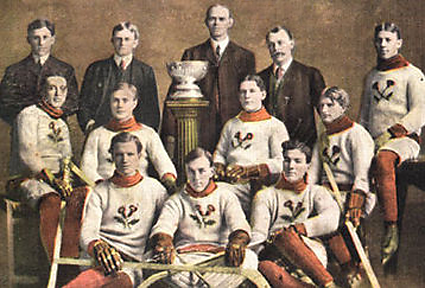
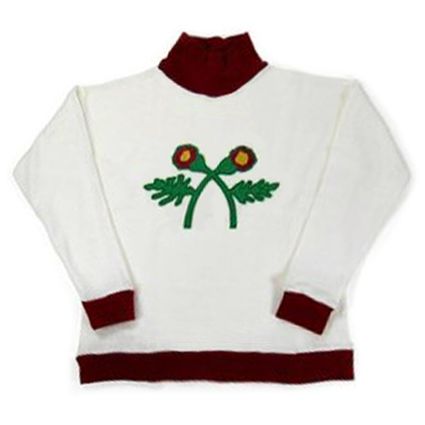

The cup was donated, at the urging of his two sons Arthur and Algernon, by Lord Stanley of Preston, then the Governor General of Canada, with the intent of creating a way to recognize which club was the current champion.
There was no single league across the whole of Canada at the time, so the format of awarding the cup was based on a challenge format, where the champion of one of the various amateur senior hockey associations could issue a challenge to the holders of the cup. This meant that challenge games could happen at any time during the season as challenges were approved, or ordered, by the cup's trustees. For example, the Ottawa Hockey Club faced four separate challenges for the cup, defended successfully each time, between January and March of 1904 from the Winnipeg Rowing Club, the Toronto Marlboros, the Montreal Wanderers and Brandon Wheat Cities, the latter two taking place just one week apart.
The challenge system was in effect until 1914, with the challenges varying from single-elimination games to best of three or two games, total goals series throughout the challenge era, when the trustees of the cup agreed that it would now be awarded to the winner of a playoff series each season between the champions of the professional National Hockey Association (NHA) and the Pacific Coast Hockey Association (PCHA) leagues.
It was on this date in 1907 that the Kenora Thistles captured the Stanley Cup as they successfully completed a two-game total-goal series against the current cup holders, the Montreal Wanderers, by a score of 12-8.
The Wanderers had held the cup since March of 1906 and had defended the cup once in December of 1906 before the Thistles issued their challenge based on being the champions of the Manitoba Professional Hockey League (MPHL).
The Thistles won the first game at the Montreal Arena on January 17, 1907 4-2 and captured the cup four days later by outlasting the Wanderers 8-6. Members of the Thistles included future Hockey Hall of Famers Joe Hall, Tom Hooper, captain Tommy Phillips and Art Ross.
Kenora would retain the cup two months later on March 16 and 18, 1907 by winning the MPHL playoffs against the Brandon Wheat Cities club in a best-of-three series 2 games to none by scores of 8-6 and 4-1.
Just five days after defending the cup, Kenora faced another challenge, this time from the same Montreal Wanderers whom they had taken the cup from exactly two months earlier. The Wanderers took game one in the two-game total-goals series by a commanding 7-2 margin. The Thistles preserved some pride by winning Game 2 by a score of 6-5, but it was not enough to overcome the five goal advantage the Wanderers took into the contest, as they regained the rights to the cup by a final margin of 12 goals to 8, ending the Thistles reign as cup holders at a mere 62 days, the shortest reign in Stanley Cup history.

The 1907 Stanley Cup champion Rat Portage Thistles luckily
took time to pose with their trophy during the brief two months they held it
Of note, while each previous cup champion had the right to engrave the name of their club onto the cup, it was the Wanderers who were the first to include the names of each individual player on the championship team, a practice which became an annual tradition in 1924 and set the cup on it's journey from 7 inch bowl to the three foot tall trophy it is today.
Kenora, originally called "Rat Portage", then with a population of just 4,000 holds the record as the smallest city to ever hold the Stanley Cup. It is located 2oo kilometers east of Winnipeg, directly above Minnesota, in far western Ontario.
The Rat Portage Thistles were founded in 1896 and unsuccessfully challenged for the cup twice before in 1903 and 1905 when they were turned back by the Ottawa Silver Seven. It was later in the summer of 1905 that Rat Portage changed it's name to Kenora. The Thistles hockey club would fold during the 1907-08 MPHL season.
The 1897 Rat Portage Thistles
Today's featured jersey is a 1907 Kenora Thistles Art Ross jersey. The Thistles name was chosen in a contest and the winner was a local Scottish carpenter named Bill Dunsmore who not only submitted the name in reference to the region's Scottish heritage, but a drawing of a thistle for the team's logo.
This jersey is the style worn by the Stanley Cup champion Thistles club, which included Ross, who would go on to be not only a player, but a general manager and coach in the NHL and have the trophy for the NHL's annual trophy for the league's leading scorer, the Art Ross Trophy, named after him.
These jerseys were reproduced by the CBC in connection with their "Hockey: A People's History" documentary, and are sadly no longer available on demand.

In another one of those amazing youtube moments, here is a video on the Kenora Thistles. While the original Thistle club disbanded in 1908, subsequent clubs in Kenora have adopted the Thistle name, which was the case for the club that Louis McKay played on in 1934.
Labels:
Kenora Thistles,
Rat Portage Thistles,
Ross Art
Wednesday, January 20, 2016
1975-76 St. Louis Blues Chuck Lefley Jersey
Born on this date in 1950 in Winnipeg, Chuck Lefley began his career with his hometown Winnipeg Rangers of the Manitoba Junior Hockey League in 1965. There, the center racked up 39 points in 46 games to earn league rookie of the year honors as the Rangers would go on to win the Turnbull Cup as league champions. He would follow that up with a 25 goal, 46 point season in 1966-67.
Rather than join a team higher up the junior ranks for the following season, Lefley instead chose to become a member of the Canadian National Team, whom he played for over the course of the next three seasons, which included his participation in the 1969 World Championships, Canada's final participation in the World Championships until 1977 due to a dispute over the amateur status of players from Soviet Bloc countries.
After three seasons with the national team, Lefley played in seven games for the Brandon Wheat Kings of the WHL, impressively scoring 6 goals and 12 points. That spring he was drafted by the Montreal Canadiens 6th overall in the 1970 NHL Amateur Draft.
He would spend the vast majority of the 1970-71 season in the American Hockey League with the Montreal Voyageurs, scoring 35 points in 48 games. He would also make his NHL debut with a single game with the Canadiens as well as one playoff game later that year, which was enough to earn Lefley his name on the Stanley Cup despite only two games of NHL experience as the Canadiens would claim the title following a seven game series against the Chicago Black Hawks!
Lefley would play 16 games with the Canadiens, scoring his first NHL points with a pair of assists, but once again spent most of his time with the Voyaguers in the AHL, who had now been relocated to Nova Scotia. During the post season, the Voyageurs would defeat Springfield, Boston and Baltimore while Lefley came in third in team scoring with 14 points in 15 games as Nova Scotia captured the Calder Cup as league champions.
Lefley would become a full-time member of the Canadiens in 1972-73, registering his first 20 goals season with 21 on his way to 46 points as part of the powerhouse Montreal roster. During the playoffs, Buffalo fell first, followed by Philadelphia before Chicago fell victim once again, giving Lefley the second Stanley Cup of his career, only this one slightly more earned with
8 points in 17 games.
The 1973-74 season saw Lefley raise his career highs to 23 goals and 54 points. He played in 18 games with Montreal in 1974-75, but his scoring touch had gone away, with just 1 goal and 3 points at the time of his trade to the St. Louis Blues.
While the Montreal lineup was stacked with future hall of famers on the verge of their latest Stanley Cup dynasty, the Blues welcomed Lefley's offensive skills to their roster. Given ample playing time and responsibility, he equalled his 23 goals from the previous season while playing 17 less games than the year before.
The 1975-76 season would prove to be the best of Lefley's career, as he would register 43 goals, 20 more than any other season of his career. The 43 goals would place him in the top ten in the NHL and his 85 points would lead St. Louis in scoring as well as setting club records in both categories in the process.
He would play one more season, but lack the drive and excitement he had brought to his game the previous season. He point totals would drop precipitously, finishing with just 11 goals and 41 points. He would surprise everyone by walking away from his contract and retiring at the end of the season with plans to return to his farm in Manitoba.
If that were not surprising enough, he really caught everyone off guard at the following season when he played for Jokerti Helsinki in Finland, a very uncommon move in the 1970's for a North American player. Of their 36 games, Lefley appeared in 24, scoring 11 goals and 12 points, equalling his NHL goal total from the year before.
He travelled even further east for the 1978-79 season, joining his older brother and defenseman Bryan Lefley as members of Dusseldorfer EG in West Germany, where in 26 games he scored 17 goals and 22 points, clearly a shoot first mentality as evidenced by just 5 assists! Bryan, who had been with the Colorado Rockies the previous season, would remain in with Dusseldorf for another season before finishing his career with SC Bern in Switzerland.
He returned to St. Louis for the 1979-80 season to resurrect his NHL career, but a hard hit in training camp separated his shoulder, which limited him to 28 games for the season. He returned to the Blues for the 1980-81 season, but decided his career was over after just two games, retiring for good this time.
His final NHL totals were 407 games played, 128 goals and 164 assists for 292 points as well as 13 points in 29 playoff games and his name on the Stanley Cup twice.
Today's featured jersey is a 1975-76 St. Louis Blues Chuck Lefley jersey. This was the second version of the Blues dark jerseys, as their original 1967-68 ones had the colors on the stripes reversed. Names were added permanently in 1977-78 and colored shoulders, matching the style of their white jerseys, came in 1979 and remained in use through 1984.
Labels:
Lefley Chuck,
St. Louis Blues
Tuesday, January 19, 2016
1988-89 Harvard Crimson Peter Ciavaglia Jersey
The first collegiate hockey game in the oldest active rivalry in the United States was played on this date in 1898 when Brown University defeated Harvard University by a score of 6-0 in a game played outdoors at Franklin Field in Boston, Massachusetts.
The 1898 Brown University hockey team, winners of the
first game of the oldest collegiate rivalry in the United States
first game of the oldest collegiate rivalry in the United States
The Boston Herald's account of the game
Brown would win again the following year by a score of 2-1, but Harvard would even the score in 1900 with a pair of wins over Brown in back to back games.
Since that first meeting back in 1898, the Harvard Crimson holds a 110-46-13 all-time lead in American college hockey's oldest rivalry, a rivalry which will be renewed on February 5th when Harvard travels to meet Brown for the second time this season, following Harvard's 5-2 win at home back on November 7th.
Brown, based in Providence, Rhode Island, originally played men's hockey from 1898 until 1906. They resumed play in 1926-27 through 1939 before taking an extended break during World War II.
The 1929-30 Brown Bears
Play resumed in 1947 as an independent club until joining the Eastern Collegiate Athletic Conference in 1961-62, where they have retained membership ever since. Notable seasons for Brown have included 1964-65, going 21-9, and the 1975-76 season which saw Brown finish with a record of 23-7.
The 1975-76 Brown Bears
Their last NCAA appearance came in 1993, when they were defeated by Minnesota-Duluth in the first round. They came in third in 1976 following a 7-6 loss to Michigan Tech in two overtimes followed by an 8-7 win over Boston University. They took fourth in the nation in 1965 and were runners-up to Michigan back in 1951 following an 18-6 regular season.
Notable NHLers to have played for Brown include Curt Bennett, Tim Bothwell and Todd Simpson among the 14 Bears to have appeared in the NHL.
Curt Bennett while with Brown and later the Atlanta Flames
Harvard, meanwhile, played just the one game in 1898, but fielded a team continuously through 1916-17, taking a break of one year due to World War I.
Hockey at Harvard Stadium, circa 1910
Starting up again in 1918-19, played through 1942-43 before they too, suspended play during World War II, resuming again in 1945-46 after a two year hiatus.
The 1931 Harvard Crimson hockey team
Harvard played as an independent until 1960-61 when the ECAC was formed due to the NCAA selection committee overlooking any Boston area schools, which prompted the formation of the ECAC, with the conference tournament champion earning an automatic bid to the NCAA tournament.
The Crimson has won the regular season conference title thirteen times, with a period of dominance from 1985-86 to 1993-94 seeing them win 7 times in 9 seasons, the first four of those won consecutively under long time coach and 1960 United States gold medalist Bill Cleary, who ran the program from 1971 to 1990.
Longtime Crimson head coach Bill Cleary
Additionally, Harvard has won the ECAC post season tournament 9 times in 1963, 1971, 1983, 1987, 1994, 2002, 2004, 2006 and most recently 2015. Harvard has made the NCAA tournament 22 times, winning the national championship in overtime in 1989 and posting runner-up finishes in 1983 and 1986. Since 2000, they qualified five years running from 2002 until 2006 and most recently in 2015.
Ed Krayer scores the overtime goal to win the national championship in 1989
Team Captain Lane MacDonald with the 1989 NCAA championship trophy
Harvard has had three players win the Hobey Baker Award, Mark Fusco in 1983, Scott Fusco in 1986 and Lane McDonald in 1989. 27 Crimson players have appeared in the NHL, with some of the better known ones being Craig Adams, current Crimson head coach Ted Donato, Dominic Moore and Don Sweeney.
Current NHLer Dominic Moore while captain of the Harvard Crimson
Today's featured jersey is a 1988-89 Harvard Crimson Peter Ciavaglia jersey as worn during Harvard's championship victory in 1989. The Crimson began the season with 15 straight wins to earn the #1 overall ranking in the country. They went on to win their first Beanpot Tournament in 8 years to further demonstrate they were a club not to be overlooked that season.
Their number one line, the "Line of Fire" consisted of Hobey Baker winner MacDonald, and runner up Allen Bourbeau as well as C. J. Young, both of whom had played for the United States at the 1988 Olympics in Calgary. Additionally, Peter Ciavaglia and Donato would both play in the 1992 Olympics in Albertville, France. The Crimson won the ECAC regular season title and entered the playoffs with a stellar 24-2 record.
They learned from being beaten in overtime during the ECAC playoffs, and went on to defeat defending champions Lake Superior State in the NCAA playoffs 4-2 and 5-2 in their best-of-three series. They defeated Michigan State 6-3 to advance to the finals against the University of Minnesota, a game held in the Golden Gophers backyard in St. Paul.
In one of the greatest games ever played, the two teams traded goals back and forth, ending regulation of the exhilarating contest tied at 3-3. In overtime, Ciavaglia won a faceoff in the Minnesota zone back to Ed Krayer, who passed it to Brian McCormack who fired a shot which rebounded off Minnesota goaltender Robb Stauber's pad to Krayer, who moved to his right, forcing Stauber to move, which allowed Krayer the opening he needed to slide the puck between Stauber's legs for the championship winning goal, giving Harvard it's first championship in any NCAA sport.
Harvard's classic jerseys, rivaling those of teams like the Chicago Blackhawks for unchanging longevity, are true hockey classics, with their simple waist and arm stripes, colored shoulder yoke and "Harvard" vertically arched above each players number on the front. They jerseys are topped off with the school crest, which contains the university motto Veritas, Latin for "truth".
Today's video section is footage from Harvard's 1989 NCAA championship victory over Minnesota. won in overtime. For some reason the video is compressed horizontally, but it's the first time in years we have been able to find any footage of the championship winning goal online and will have to do for now.
Labels:
Brown University,
Harvard University
Monday, January 18, 2016
2008-09 Pittsburgh Penguins Ruslan Fedotenko Jersey
At the age of 16, Ruslan Fedotenko had a busy 1995-96 season, playing for the School of Higher Sports Mastery Kiev in the Eastern European Hockey League. A winger, Fedotenko scored 9 goals and 20 points in 33 games. He also played for his home town Sokol Kiev team in two games as well as playing internationally for Ukraine in both the European U18 Junior Championships (5 games, 2 goals and 1 assist) and the World Junior Championships (6 games, 1 assist).
The 1996-97 season saw Fedotenko play in Finland for a variety of teams associated with TPS of Turku, including the TPS U18 team, the TPS U20 club and Kiekko-67 in Division I. He also played for Turku HT in the Division II playoffs. Internationally, Fedotenko again appeared in both the European U18 championships as well as the World Juniors B pool, scoring 3 goals in 7 games.
For the 1997-98 season, Fedotenko played even farther from home, as he migrated to Canada and spent the entire season with the Melfort Mustangs of the Saskatchewan Junior Hockey League where he averaged nearly a point per game wtih 35 goals and 66 points in 68 games.
It has his fourth country in four years for Fedotenko, born on this date in 1979, when he played for the Sioux City Musketeers in the United States Hockey League, where he erupted for 43 goals and 77 points in 55 games to finish second in league scoring.
Fedotenko went undrafted and was signed by the Philadelphia Flyers organization for the 1999-00 season. He spent the majority of his first professional season with the Philadelphia Phantoms of the American Hockey League (17 goals and 51 points in 57 games) as well as 8 games with the Trenton Devils of the ECHL.
Fedotenko started the season with 8 games for the Phantoms before making his NHL debut with the Flyers on October 24, 2000. He wasted no time establishing himself as a full-time NHLer, playing in 74 games and scoring 16 goals and 36 points, good for seventh on the club.
He played another 78 games for the Flyers in 2001-02, scoring another 17 goals and 26 points as well as being a +15. During the 2002 Olympics, the NHL took a break from it's schedule for the First Round, but not the Preliminary Round. Fedotenko was able to arrive in time of Ukraine's final game, an essential 4-2 win over France, but an earlier 1-0 loss to Belarus before he could arrive meant the end of the competition for the Ukrainians after just one game for Fedotenko.
At the 2002 NHL Draft, Fedotenko was traded, along with two second round draft choices to the Tampa Bay Lightning for their first round pick (4th overall). Over the next two seasons, the steady Fedotenko gave the Lightning more of the same with 18 goals and 32 points in 2002-03 followed by 17 goals and 39 points in 2003-04.
In the 2004 postseason, Fedotenko got hot and was a key player in the Lightning's run through the playoffs, tying for the team lead in goals with 12 as the Lightning won the Stanley Cup in seven games over the Calgary Flames, with Fedotenko starring as he scored both Tampa Bay goals in a narrow 2-1 Game 7 win.
Unlike many NHL players who either played in a European league or a North American minor league, Fedotenko sat out 2004-05 when the NHL season was cancelled. He returned to Tampa Bay in fine form, setting career highs with 26 goals and 41 points.
His production dropped in 2006-07 to 12 goals and 32 points to conclude his time with the Lightning, as his contract expired and he signed for the 2007-08 season with the New York Islanders. During his only season on Long Island, Fedotenko scored 16 goals and 33 points in 67 games.
A free agent once again, this time Fedotenko chose to play for the Pittsburgh Penguins beginning in 2008-09, where he contributed his customary 16 goals and 39 points, his sixth season of between 16 and 18 goals and scoring in the 30's in points.
During the playoffs, Fedotenko scored 7 goals and 14 points in 24 games, tied for fourth on the team in both categories, as the Penguins would defeat the Detroit Red Wings for the second Stanley Cup of Fedotenko's career.
He had another 30 point season for Pittsburgh in 2009-10 before leaving for the New York Rangers as a free agent for the 2010-11 season. He would play two seasons for New York's other team, with 10 goals and 25 points followed by 9 goals and 20 points, ending a run of ten seasons of double digit goals.
For the 2012-13 season, Fedotenko returned home to Ukraine to play for HC Donbass, the only team from Ukraine during their first season in the predominately Russian Kontinental Hockey League while the NHL season was delayed by labor issues. After 33 games, the NHL's labor issues were resolved and Fedotenko returned to his original club, the Flyers. In 47 games, he contributed 4 goals and 13 points.
Before the 2013-14 season, Fedotenko signed a three year contract to return to Donetsk, Ukraine to rejoin HC Donbass as their team captain. He would play in 46 games, scoring 7 goals and 17 points.
But before the 2014-15 season could begin, the political situation in Ukraine became unsettled, with protests in Kiev resulting in the exile of Ukraine President Viktor Yanukovych, who favored closer ties with Russia rather than the European Union.
The Ukraine oblasts of Donetsk and Luhansk, similar to a state or province in North America, known collectively as the Donbass region, are located farthest east and are populated heavily with Russians who moved into the area during the days of the Soviet Union. Following the annexation of the Crimea region of Ukraine by Russia, pro-Russian protests broke out in Donbass, which then led to self-declared republics in both Donetsk and Luhansk. This eventually escalated into an armed conflict between the Ukraine government and the separatist forces of the republics, who favor close ties with Russia.
With the region on the verge of a state of war, Fedotenko returned to North America after an injury cost him a chance to play for Ukraine at the 2014 World Championships.
"The season ended and I was eager to get home (to Tampa, Florida), just get out of there and get home to my family and make sure I was safe. That was the top priority at the end of the season," Fedotenko said, following the two of the last three home playoff games scheduled for Donetsk being relocated to Bratislava, Slovakia due to concerns over the worsening situation in Ukraine.
Two days after Fedotenko flew back to the United States, the Donetsk airport was closed and has since been reduced to rubble by prolonged bombings.
Eventually Russian armed forces moved into the Donbass region of Ukraine to support the separatists and war broke out. There were cease fires agreed to, none of which lasted very long and the damage to the area was extensive. All the unrest and uncertainty, which including the looting and arson of the team's Druzhba Arena, led to HC Donbass having to suspend operations for the 2014-15 season.
Additionally, the 2015 IIHF Division IA World Championships scheduled to take place in Donetsk were moved to Krakow, Poland.
Fedotenko got an offer of a tryout with the New Jersey Devils, but did not make the team's roster. He then signed a professional tryout contract with the Iowa Wild of the AHL. He eventually played just 13 games with Iowa in 2014-15, but returned to the team for the current 2015-16 season. His return to the NHL looks to be a long shot, as to date he has only played in 16 of Iowa's 41 games.
Today's featured jersey is a 2008-09 Pittsburgh Penguins Ruslan Fedotenko jersey as worn the season Fedotenko won his second Stanley Cup.
The Penguins began wearing this style jersey for the 2007-08 season and continue to wear it through today, although word is the club will have new jerseys for next season, perhaps bringing to an end the use of the pale Las Vegas Gold in favor of a return to the bright yellow gold the club wore from 1980 to 2002.
Bonus jersey: Today's bonus jersey is a 2000-01 Philadelphia Flyers Ruslan Fedotenko jersey. as worn during his rookie season in the NHL. The Flyers first introduced this black jersey as an alternate for the 1997-98 season. It was promoted to the team's road jersey for 2001-02 when their orange road jerseys were discontinued after the 2000-01 season. It remained in use through the 2006-07 season when a new black jersey debuted in the new Reebok Edge style.
Today's video section begins with highlights of Fedotenko scoring his two goals in Game 7 of the Stanley Cup Finals in 2004.
The 1996-97 season saw Fedotenko play in Finland for a variety of teams associated with TPS of Turku, including the TPS U18 team, the TPS U20 club and Kiekko-67 in Division I. He also played for Turku HT in the Division II playoffs. Internationally, Fedotenko again appeared in both the European U18 championships as well as the World Juniors B pool, scoring 3 goals in 7 games.
For the 1997-98 season, Fedotenko played even farther from home, as he migrated to Canada and spent the entire season with the Melfort Mustangs of the Saskatchewan Junior Hockey League where he averaged nearly a point per game wtih 35 goals and 66 points in 68 games.
It has his fourth country in four years for Fedotenko, born on this date in 1979, when he played for the Sioux City Musketeers in the United States Hockey League, where he erupted for 43 goals and 77 points in 55 games to finish second in league scoring.
The 1998-99 Sioux City Musketeers
Fedotenko went undrafted and was signed by the Philadelphia Flyers organization for the 1999-00 season. He spent the majority of his first professional season with the Philadelphia Phantoms of the American Hockey League (17 goals and 51 points in 57 games) as well as 8 games with the Trenton Devils of the ECHL.
Fedotenko started the season with 8 games for the Phantoms before making his NHL debut with the Flyers on October 24, 2000. He wasted no time establishing himself as a full-time NHLer, playing in 74 games and scoring 16 goals and 36 points, good for seventh on the club.
He played another 78 games for the Flyers in 2001-02, scoring another 17 goals and 26 points as well as being a +15. During the 2002 Olympics, the NHL took a break from it's schedule for the First Round, but not the Preliminary Round. Fedotenko was able to arrive in time of Ukraine's final game, an essential 4-2 win over France, but an earlier 1-0 loss to Belarus before he could arrive meant the end of the competition for the Ukrainians after just one game for Fedotenko.
At the 2002 NHL Draft, Fedotenko was traded, along with two second round draft choices to the Tampa Bay Lightning for their first round pick (4th overall). Over the next two seasons, the steady Fedotenko gave the Lightning more of the same with 18 goals and 32 points in 2002-03 followed by 17 goals and 39 points in 2003-04.
In the 2004 postseason, Fedotenko got hot and was a key player in the Lightning's run through the playoffs, tying for the team lead in goals with 12 as the Lightning won the Stanley Cup in seven games over the Calgary Flames, with Fedotenko starring as he scored both Tampa Bay goals in a narrow 2-1 Game 7 win.
Unlike many NHL players who either played in a European league or a North American minor league, Fedotenko sat out 2004-05 when the NHL season was cancelled. He returned to Tampa Bay in fine form, setting career highs with 26 goals and 41 points.
His production dropped in 2006-07 to 12 goals and 32 points to conclude his time with the Lightning, as his contract expired and he signed for the 2007-08 season with the New York Islanders. During his only season on Long Island, Fedotenko scored 16 goals and 33 points in 67 games.
Fedotenko spent one season with the Islanders
A free agent once again, this time Fedotenko chose to play for the Pittsburgh Penguins beginning in 2008-09, where he contributed his customary 16 goals and 39 points, his sixth season of between 16 and 18 goals and scoring in the 30's in points.
During the playoffs, Fedotenko scored 7 goals and 14 points in 24 games, tied for fourth on the team in both categories, as the Penguins would defeat the Detroit Red Wings for the second Stanley Cup of Fedotenko's career.
Fedotenko won his second Stanley Cup with the Penguins
He had another 30 point season for Pittsburgh in 2009-10 before leaving for the New York Rangers as a free agent for the 2010-11 season. He would play two seasons for New York's other team, with 10 goals and 25 points followed by 9 goals and 20 points, ending a run of ten seasons of double digit goals.
For the 2012-13 season, Fedotenko returned home to Ukraine to play for HC Donbass, the only team from Ukraine during their first season in the predominately Russian Kontinental Hockey League while the NHL season was delayed by labor issues. After 33 games, the NHL's labor issues were resolved and Fedotenko returned to his original club, the Flyers. In 47 games, he contributed 4 goals and 13 points.
Before the 2013-14 season, Fedotenko signed a three year contract to return to Donetsk, Ukraine to rejoin HC Donbass as their team captain. He would play in 46 games, scoring 7 goals and 17 points.
but those plans were derailed by the outbreak of war in the region
But before the 2014-15 season could begin, the political situation in Ukraine became unsettled, with protests in Kiev resulting in the exile of Ukraine President Viktor Yanukovych, who favored closer ties with Russia rather than the European Union.
The Ukraine oblasts of Donetsk and Luhansk, similar to a state or province in North America, known collectively as the Donbass region, are located farthest east and are populated heavily with Russians who moved into the area during the days of the Soviet Union. Following the annexation of the Crimea region of Ukraine by Russia, pro-Russian protests broke out in Donbass, which then led to self-declared republics in both Donetsk and Luhansk. This eventually escalated into an armed conflict between the Ukraine government and the separatist forces of the republics, who favor close ties with Russia.
With the region on the verge of a state of war, Fedotenko returned to North America after an injury cost him a chance to play for Ukraine at the 2014 World Championships.
"The season ended and I was eager to get home (to Tampa, Florida), just get out of there and get home to my family and make sure I was safe. That was the top priority at the end of the season," Fedotenko said, following the two of the last three home playoff games scheduled for Donetsk being relocated to Bratislava, Slovakia due to concerns over the worsening situation in Ukraine.
Two days after Fedotenko flew back to the United States, the Donetsk airport was closed and has since been reduced to rubble by prolonged bombings.
Eventually Russian armed forces moved into the Donbass region of Ukraine to support the separatists and war broke out. There were cease fires agreed to, none of which lasted very long and the damage to the area was extensive. All the unrest and uncertainty, which including the looting and arson of the team's Druzhba Arena, led to HC Donbass having to suspend operations for the 2014-15 season.
Additionally, the 2015 IIHF Division IA World Championships scheduled to take place in Donetsk were moved to Krakow, Poland.
Fedotenko got an offer of a tryout with the New Jersey Devils, but did not make the team's roster. He then signed a professional tryout contract with the Iowa Wild of the AHL. He eventually played just 13 games with Iowa in 2014-15, but returned to the team for the current 2015-16 season. His return to the NHL looks to be a long shot, as to date he has only played in 16 of Iowa's 41 games.
Today's featured jersey is a 2008-09 Pittsburgh Penguins Ruslan Fedotenko jersey as worn the season Fedotenko won his second Stanley Cup.
The Penguins began wearing this style jersey for the 2007-08 season and continue to wear it through today, although word is the club will have new jerseys for next season, perhaps bringing to an end the use of the pale Las Vegas Gold in favor of a return to the bright yellow gold the club wore from 1980 to 2002.
Bonus jersey: Today's bonus jersey is a 2000-01 Philadelphia Flyers Ruslan Fedotenko jersey. as worn during his rookie season in the NHL. The Flyers first introduced this black jersey as an alternate for the 1997-98 season. It was promoted to the team's road jersey for 2001-02 when their orange road jerseys were discontinued after the 2000-01 season. It remained in use through the 2006-07 season when a new black jersey debuted in the new Reebok Edge style.
Today's video section begins with highlights of Fedotenko scoring his two goals in Game 7 of the Stanley Cup Finals in 2004.
Next, Fedotenko talks about his day with the Stanley Cup after winning it for the second time with Pittsburgh in 2009.
Subscribe to:
Comments (Atom)

